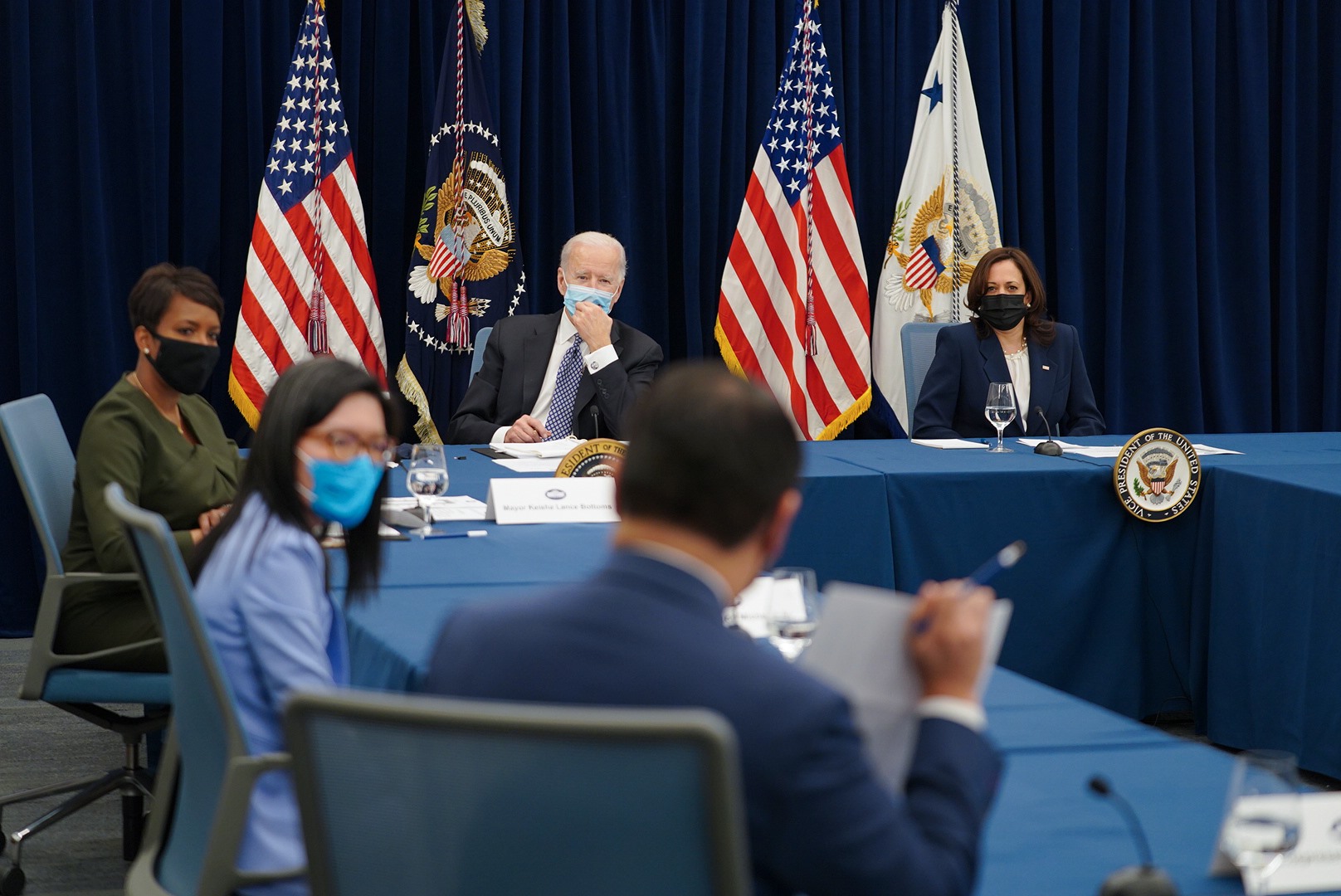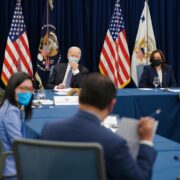
UNITED States President Joe Biden and Vice President Kamala Harris met with Asian American leaders in Atlanta on Friday, March 19, three days after eight people, including six Asian women, were fatally shot at three spas in the area.
“Racism is real in America and it has always been. Xenophobia is real in America, and always has been. Sexism too,” said Harris, the first woman and the first Asian American in the country’s second-highest post. “A harm against any one of us is a harm against all of us. The president and I will not be silent. We will not stand by. We will always speak out against violence, hate crimes and discrimination wherever and whenever it occurs.”
The Atlanta trip was previously scheduled to promote the passage of the $1.9 trillion coronavirus relief package, but shifted to focus on listening and supporting the Asian American community amid the violent attacks.
The president and vice president spoke with local Asian American elected leaders and representatives of social justice and nonprofit organizations in a closed-door meeting for about 80 minutes before addressing the nation from Emory University.
“Whatever the motivation is, we know this: Too many Asian Americans have been walking up and down the streets and worrying, waking up each morning for the past year feeling their safety and the safety of their loved ones are at stake,” Biden said.
New data released on Tuesday from Stop AAPI Hate — a national coalition created during the beginning of the pandemic — revealed that from March 19, 2020 to February 28, 2021, the reporting center received 3,795 firsthand incidents of racism and discrimination from all 50 states and the District of Columbia.
Of that number, 503 incidents took place in the first two months of 2021 alone. Women are 2.3 times more likely to report the versus men, the group also found.
Biden continued his remarks citing some examples of the fear and hatred, from grandparents afraid to leave their homes to small business owners being attacked.
“Some of them are the most vulnerable people in our nation — the elderly, low-wage workers and women. In fact, Asian American women suffer twice as many incidents of harassment and violence as Asian American men,” Biden said. “We’re learning again what we’ve always known: words have consequences.”
Biden, who has experienced his own share of grief in losing family members, ended the speech by offering condolences to the families who lost loved ones in the shooting.
“I assure you, the one you lost will always be with you. The day will come when their memory brings a smile to your lips before it brings a tear to your eye, as unbelievable as that is now. It will take a while. And I promise you it will come. When it does, that’s the day you know you’re going to make it,” he said.
During the meeting, a letter, signed by over 180 national AAPI organizations, was delivered to Biden and Harris calling for emergency safety and relief by committing $300 million — $100 million toward community-based solutions to address the most vulnerable members of hate and bias, including women and the elderly, and $200 million for long-term safety and recovery.
The organizations said the commitment would go toward:
• Providing funds for holistic wrap-around victim assistance services including in-language hate reporting, mental health, comprehensive support, system navigation and advocacy for victims and survivors
• Creating alternatives to law enforcement including violence prevention, crisis intervention and transformative justice programs that are culturally and linguistically accessible and that focus on vulnerable members of our communities including but not limited to working-class people, undocumented and immigrant communities, women, LGBTQ communities, people of faith
• Creating a federal interagency task force staffed at the White House that coordinates efforts of the federal government, and meets regularly with local and national AAPI organizations and advocates, coordinates governmental response, that protects the civil rights of AAPI communities, provides arts and cultural programming, and supports development and dissemination of in-language public outreach materials and resources
• Supporting community-based organizations that are on the frontlines of crisis response and recovery to build community infrastructure over the long term
• Supporting programming that encourages cross-racial dialogues and community building
• Providing relief for AAPI essential workers and low-wage workers who are confronting the twin pandemics of COVID-19 and systemic racism, including support and benefits for undocumented and immigrant AAPI community members
• Resources should be disaggregated to ensure that they are appropriately directed to Native Hawaiian and Pacific Islander communities and organizations on the ground
• Including the voices of Pacific Islanders by meeting specifically with Native Hawaiian and Pacific Islander communities and adding NHPI representation on the COVID Equity Taskforce.
“The Asian American and Pacific Islander community need help to recover — not only from the devastating violence brought down on us by racist scapegoating, but from the economic damage and loss of health and life brought on by the pandemic. We need support that recognizes and addresses the realities we’re living in and flows to the people who need it most. That requires actual, long-term investment,” National Asian Pacific American Women’s Forum Executive Director Sung Yeon Choimorrow said in a statement.
Earlier on Friday, Biden urged Congress to “swiftly” pass the COVID-19 Hate Crimes Act, legislation introduced by Sen. Mazie Hirono (D-Hawaii) and Rep. Grace Meng (D-NY) that addresses the rise of hate crimes and violence targeted against the AAPI community by assigning a point person at the Department of Justice to expedite the review of COVID-19-related hate crimes.
The bill would also provide support for state and local law enforcement agencies to respond to these hate crimes, and coordinating with local and federal partners to mitigate racially discriminatory language used to describe the pandemic.
In his first week in office, the president signed an executive order on Jan. 26, which included directives to remove language in federal actions or documents that would contribute to xenophobia and racism against the Asian American and Pacific Islander population and for the Department of Justice to expand its collection of data and public reporting regarding hate incidents against community members.
“Now, it’s time for Congress to codify and expand upon these actions — because every person in our nation deserves to live their lives with safety, dignity, and respect,” he said in a statement.
Members of the AAPI community who have experienced hate during the pandemic are encouraged to report the incident at: https://stopaapihate.org/reportincident/. In addition to English, individuals can report in one of 11 languages, including Tagalog.






